SHS Alum Andrew Weber Speaks on Countering Weapons of Mass Destruction
- Monday, 21 May 2018 13:01
- Last Updated: Tuesday, 22 May 2018 12:56
- Published: Monday, 21 May 2018 13:01
- Sarah Kazan and Derek Moritz
- Hits: 5409
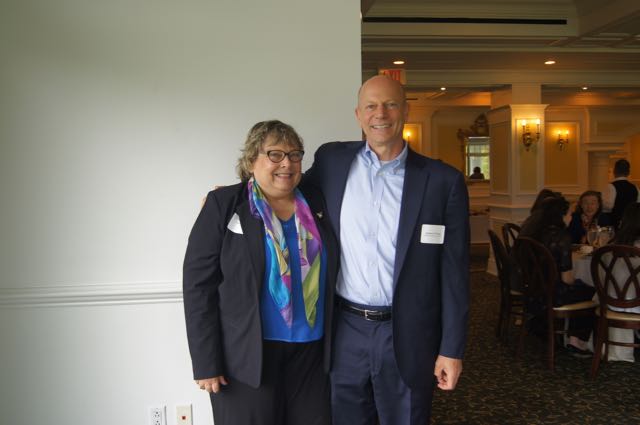 Associate Village Justice Cindy Dunne and Andrew Weber The League of Women Voters annual spring luncheon on Friday May 18 featured Scarsdale alumni Andrew C. Weber who gave a captivating presentation about “Countering Weapons of Mass Destruction.” He gave a revealing explanation about the wide range of nuclear, biological and chemical weapons that are currently being produced and stored around the world.
Associate Village Justice Cindy Dunne and Andrew Weber The League of Women Voters annual spring luncheon on Friday May 18 featured Scarsdale alumni Andrew C. Weber who gave a captivating presentation about “Countering Weapons of Mass Destruction.” He gave a revealing explanation about the wide range of nuclear, biological and chemical weapons that are currently being produced and stored around the world.
Weber explained his career trajectory to foreign service. After graduating from Scarsdale High School in 1978, he attended Cornell University and now holds a Master of Science in Foreign Service (MSFS) degree from Georgetown University, where he also taught a course on Force and Diplomacy for eight years. Weber dedicated thirty years of his life to working with the US government, including five and a half years as President Obama’s Assistant Secretary of Defense for Nuclear, Chemical, and Biological Defense programs. In addition, he was an essential part of the Nunn-Lugar Cooperative Threat Reduction efforts to remove weapons-grade uranium from Kazakhstan and Georgia and nuclear-capable aircrafts from Moldova, reduce biological weapons threats, and destroy Libyan and Syrian chemical weapons stockpiles. He was also on the US leadership of the international Ebola response for the State Department. He is now an independent consultant and a strategic advisor for IP3 International and Ginkgo BioWorks. Weber serves on the Board of the Arms Control Association and the James Martin Center for Nonproliferation studies International Advisory Council and is a member of the Council on Foreign Relations.
League President Janice Starr opened the event by describing the League’s importance to the community and recognizing elected officials present including Benjamin Boykin, Amy Paulin, Dan Hochvert, Arlene Katz, Jane Veron and candidate for Congress Jonathan Lewis. Cindy Dunn then introduced Weber.
Weber’s stories sounded like the scripts of films, and indeed, his work removing uranium form Kazakhstan is now being detailed in a movie script.
Weber explained, that while serving his thirty years in the US government, he worked on the Nunn-Lugar Project to dismantle weapons of mass destruction (WMD) lying dormant throughout the Soviet union. While returning from assignment in Germany in 1992 he saw an ad in a newspaper that stated: “Looking for diplomats who find Paris a bore”.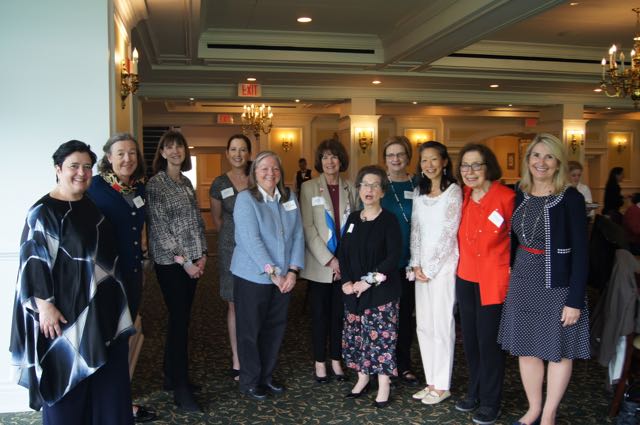 Former and Current Presidents of the League of Women Voters
Former and Current Presidents of the League of Women Voters
He answered the ad, and in 1993, he traveled to Kazakhstan, which was the fourth largest supplier of WMD’s at the time. He collected samples of water, soil, and plants to check radiation levels from former nuclear testing. But while in Kazakhstan, he was also approached by a car salesman, who asked if he wanted to buy any uranium. Intrigued, he met the factory director of the plant holding the uranium, who took him on a hunting trip to gain his trust. Weber learned that the factory held 600 kg of weapons grade uranium left over from former Soviet projects. With the cooperation of the Kazakhstan government, Project Sapphire was organized to safely transport these nuclear materials away, as they were poorly secured and at risk of being sold to construct nuclear weapons. Weber explained that transporting these materials was extremely dangerous, as the roads were covered in black ice. The materials were eventually taken to a C5 galaxy aircraft which flew nonstop to Oak Ridge, CA, where they material was converted to energy to be used at a power plant. Thanks to Project Sapphire and similar denuclearization efforts, the world went from having 50 countries with enriched uranium/plutonium to only 20 countries with enriched uranium/plutonium.
Similar to nuclear weapons, Weber oversaw the elimination of biological weapons. He visited another factory in Kazakhstan which had ten four story high fermenters of anthrax, with 300 tons in total. Thanks to the Nunn-Lugar program, he worked with the Kazakhstan government to dismantle the factory, which is now a field of grass. He also traveled to Renaissance Island, a former territory of the Soviet Union used to test biological weapons on monkeys to determine their effectiveness. They found 100 tons of buried anthrax, and worked with the government of Uzbekistan to eliminate the cultures. While the Nunn-Lugar program has helped significantly reduce the worldwide number of biological weapons, Weber’s fear moving forward is the role technology will play in creating advanced biological weapons that could be drug resistant.
Weber also warned of the necessity to eliminate chemical weapons. In 1997, all but four countries (Israel, Egypt, South Sudan, and North Korea) ratified a convention to eliminate the use of chemical weapons. In 2014, he oversaw the destruction of the last of Gaddafi's chemical weapons in Libya, mainly mustard gas. The UN also oversaw the destruction of 1,300 tons of Sarin and VX Nerve gas in Syria. Weber noted that Assad has been mostly using chlorine gas on civilians in Syria, and still has a small amount of Sarin. He also mentioned that Fentanyl, a synthetic opioid painkiller, is also a chemical weapon, and was used in 2002 by Russian forces to clear a theater occupied by Chechen terrorists, but inadvertently killed innocent theater-goers. He cautioned that despite the convention, chemical weapons are still a significant threat, as North Korea contains over 5,000 tons of chemical weaponry and leaders such as Assad have shown zero hesitation in using these weapons on civilians.
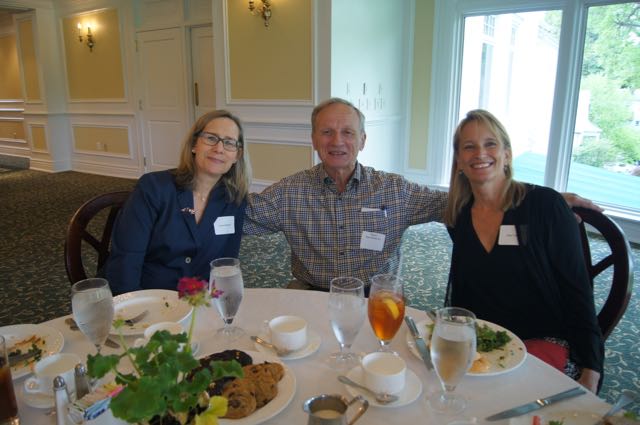 Scarsdale Mayor Dan Hochvert With Two FriendsBesides chemical weapons, Weber advocated to stop the production of new nuclear weapons. The world currently has 15,000 nuclear weapons, and creating more could lead to another arms race that would further destabilize the world. President Trump departed from forty plus years of foreign policy to reduce nuclear capabilities, and instead has decided to spend trillions on the production of more nuclear weapons moving forward. He has taken on a policy similar to Putin, which is to create smaller nukes that are “more usable”.
Scarsdale Mayor Dan Hochvert With Two FriendsBesides chemical weapons, Weber advocated to stop the production of new nuclear weapons. The world currently has 15,000 nuclear weapons, and creating more could lead to another arms race that would further destabilize the world. President Trump departed from forty plus years of foreign policy to reduce nuclear capabilities, and instead has decided to spend trillions on the production of more nuclear weapons moving forward. He has taken on a policy similar to Putin, which is to create smaller nukes that are “more usable”.
Policies such as these have lead for the doomsday clock, a measure of global stability, to only be two minutes to midnight, or doomsday. Factors included when calculating how many minutes the world is to midnight include nuclear threats, climate change, biosecurity, bioterrorism, and miscellaneous threats. Weber specifically noted that Trump’s funding for two new nuclear cruise missiles, which are guided to their targets via a computer, are especially unnecessary. Weber has been working for an arms control agreement throughout the world to eliminate this dangerous class of cruise missiles. Locally, Weber said that Representative Nita Lowey and Senator Gillibrand have specifically supported the defunding of new nuclear weapons, and hopes that young people will take a similar stand. He ended by encouraging young people to pursue a career of public service, and quoted President Carter “We must not let these weapons of the 20th century darken the skies of the 21st century.”
Weber began to take questions from the audience, and addressed the recent outbreak of Ebola in the Congo, and how the Soviets had developed Ebola as a chemical weapon. Luckily, he mentioned that this outbreak can be contained more gracefully than recent cases. Weber was the former Deputy Coordinator for the Ebola Response at the U.S. Department of State. In this position Weber was responsible for leading diplomatic outreach efforts to ensure a speedy, effective, and global response to the crisis. He was part of an effort with 70 countries to control the outbreak. A vaccine has been developed and licensed, something that they did not have access to at the beginning of the last crisis. He noted that this vaccine is now available and very effective; if deployed quickly enough they can stop the outbreak before it becomes a major epidemic.
In his time in the US government, they set up a new office devoted to combating global disease. However, since President Trump has taken office, National Security Advisor John Bolton has eliminated this office. Even though the Centers for Disease Control and Prevention (CDC) is still dedicated to eradication global diseases, Weber remarked “We need leadership but its not there… this was a really unfortunate mistake.” One lesson he has learned in his thirty years in US government is that the US cannot do anything on its own and relies heavily on its partners, for example the Ebola crisis and eliminating uranium from Kazakhstan and Syria were all team efforts with other nations. Unfortunately, he said, “there is a leadership vacuum, there is no one inline behind the US to lead on these important issues.”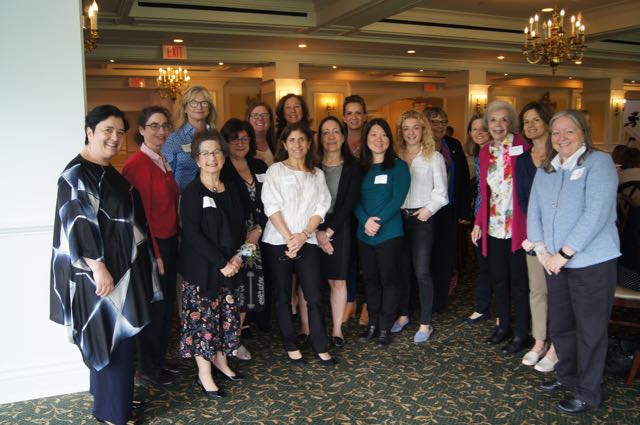 The Current Board of the League of Women Voters
The Current Board of the League of Women Voters
On the advancements of new technologies, Weber spoke on what precautions nations must take. “Technology is a blessing and a curse,” he warned. His biggest concern of new technology is that nations must understand the dangers of technology and globally there has to be an established norm, how nations use and control it. He is mainly concerned about the norm against WMDs which are now being used in Syria and North Korea; a norm against use of these weapons which used to be very strong now seems to be breaking down, which in Weber’s view is a “very scary prospect.” When a member of the audience asked if there is good will on both sides to establish a norm, Weber responded optimistically. He pointed out that there used to be five rouge states the US had to worry about, and now there are only two. With North Korea, his theory of dictators is they can move and change direction easily, there is no congress or legislation they have to worry about, however, the best way to get through to these leaders is talking to them directly. Already, world leaders have met with Kim Jong Un, including an upcoming meeting between Kim and President Trump. Kim has already agreed to close his testing sites for nuclear weapons and will stop missile launchings. Weber pointed out that Kim has seen economic prosperity in other nations, to Weber this means that Kim will potentially realize he is in a strong position to negotiate peace and even opening up trade. Weber acknowledged that this will be a very long road but the US has experienced this type of negotiation before in Russia and Kazakhstan. These first steps have shown promise to Weber.
Another way to reduce risk of nuclear war pointed out by Weber is to increase decision times. In his opinion, decision times are too short and anything that can be done to increase this time would lessen the risk of nuclear war. He also noted that both Putin and the US are using smaller nuclear weapons in regional exercises which increase the probability of a misunderstanding. A suggestion to curb this risk, Weber mentioned, is for Trump to sit down and talk to Putin; this is the only practical way to walk ourselves back from this arms race. Trump's nuclear weapons plan would cost $1.7 trillion over the next three years; Weber believes the government must evaluate spending and focus on other priorities rather than spend and exorbitant amount on nuclear weapons.
On Iran, Weber hopes that Europe, Russia, and China can keep the Iran agreement on life support without the United States. The agreement allowed for 98% of uranium to be removed from the country, the nuclear reactor to be filled with concrete, a majority of centrifuges to be taken offline, and underground facilities to close. Many of these terms, including the removal of Uranium, could never have been done militarily. The agreement also allowed for intrusive inspections that would never allow Iran to pursue a nuclear weapon. By pulling out, the US risks losing access and knowledge to Iran’s nuclear capabilities.
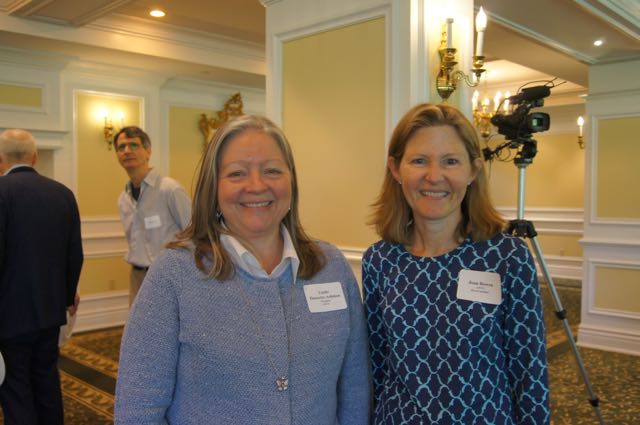 Linda Doucette-Ashman and Joan BowenWeber knew he wanted to work overseas, and pursued International Affairs at Cornell because he knew a foreign language. He pursued his education about foreign service at Georgetown and went overseas after a year of training, where there are many more opportunities available. Weber is passionate about getting young people excited about and involved with global service. He stated “It’s an incredible thing to be part of something that can be such a force of good in the world.”
Linda Doucette-Ashman and Joan BowenWeber knew he wanted to work overseas, and pursued International Affairs at Cornell because he knew a foreign language. He pursued his education about foreign service at Georgetown and went overseas after a year of training, where there are many more opportunities available. Weber is passionate about getting young people excited about and involved with global service. He stated “It’s an incredible thing to be part of something that can be such a force of good in the world.”
The next project Weber will embark on is working on a movie about his experience in Kazakhstan. He was approached by two co producers who were passionate about telling his story. The screenplay should be finished within the month, then the team will be able to move forward to find a director and be able to tell Weber’s story through his eyes.
Besides working on the movie, Weber will continue to work to remove armed missiles throughout the world. He plans to work in consulting in the Biotech sector to ensure new capabilities are not misused, and may re-enter teaching.














